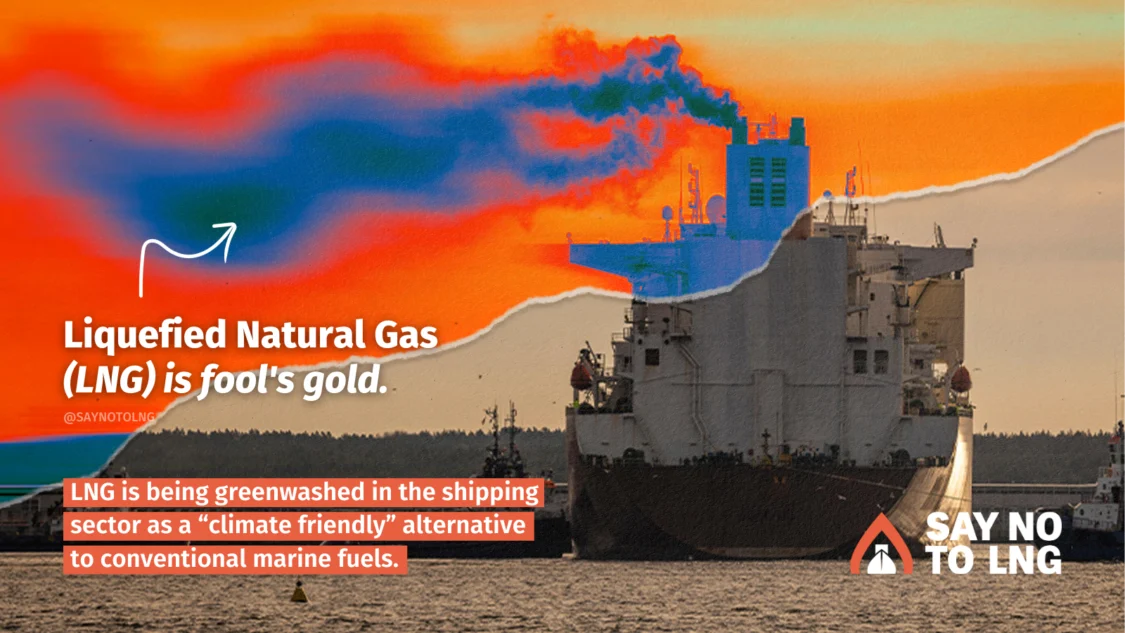LNG is widely touted as a “climate friendly” alternative fuel. Proponents claim it produces lower carbon emissions and is a low-risk pathway towards shipping decarbonisation. But how much does the public really understand about its environmental credentials?
It may be branded as clean; however, LNG is just another dirty fuel. The truth is that it can be more harmful to the environment than conventional fuels, such as marine gas oil (MGO).
Despite this, it’s being greenwashed in the shipping sector as a “climate beneficial” alternative to conventional marine fuels.
Perception of LNG versus reality
Take the cruise industry as an example. As part of the #SailingSustainably campaign, Cruise Lines International Association is praising the climate benefits of LNG, announcing that the number of LNG-powered ships is set to increase in order to reach “net zero carbon cruising by 2050”.
These tactics – along with name ‘natural gas’ – create the perception that LNG is a sustainable fuel. In reality, LNG is a harmful fossil gas and research has shown that there are no real lifecycle benefits to using LNG in the shipping sector.
With public perception so far off reality, we’re at a dangerous point where LNG could become widely implemented in the shipping industry. That’s why the Say No To LNG campaign is launching to raise awareness that LNG is, in fact, a dangerous climate pollutant.
What is LNG and how is it used in the shipping sector?
LNG is predominantly liquefied methane and is over 80x more powerful than carbon dioxide over a 20-year period.
Last year’s investigation into LNG-powered ships by Transport & Environment uncovered the significant amounts of unburned methane being released into the atmosphere. One of the main problems of using LNG as a marine fuel is the supply chain-wide uncombusted methane leaks and slips into the atmosphere accelerating the climate crisis.
To avoid crossing dangerous tipping points and to comply with the 1.5°C temperature goal of the Paris Agreement, the Say No To LNG campaign is urging the shipping sector and policymakers to eliminate the use of LNG from the sector’s decarbonisation pathways.
Willingness to rapidly reduce methane emissions was already showcased at COP26 in 2021, where 150 countries signed up for the Global Methane Pledge. Now, the campaign aims to build on this to work towards a fossil-free shipping sector.
Communities at risk
Next to being a dangerous climate pollutant, LNG is also associated with a range of other impacts, such as on communities and water usage.
In the Say No To LNG launch press release, Gerry Arances, Executive Director, Center for Energy, Ecology, and Development (CEED) & Convenor, Southeast Asia Working Group on Fossil Gas and Energy Transition for the Say No to LNG Global team, says:
“The flood of LNG that exporters want to pour into countries like the Philippines goes against our development, energy security, public health, and climate interests. When there is an abundant supply of renewables we could instead be tapping, why must we suffer polluting and climate destructive LNG?”
Investing in LNG is a dead end
In a seminal report from 2021, the World Bank examined the role of LNG within the decarbonisation of shipping and found that LNG is unlikely to play a transitional or a temporary role within that process. A study by the UCL Energy Institute highlighted that the global fleet of ships able to run on LNG is at risk of stranded assets of $848bn in 2030. This risk is exacerbated by geopolitical instabilities leading to skyrocketing LNG prices.
Lastly, the International Panel on Climate Change (IPCC) stressed in its final warning on the climate crisis as part of the sixth assessment report that deep reductions in methane are needed in order to reach net zero.
The uncomfortable truth is that there is no ‘one size fits all’ remedy. But there are solutions, and the IPCC suggests that sustainable biofuels, low-emissions hydrogen, and derivatives (including ammonia and synthetic fuels) can spur climate mitigation efforts in the shipping sector.
An LNG-free shipping industry means a cleaner shipping industry. Successful decarbonisation must take a lifecycle approach, go beyond fossil fuel solutions, meet international climate commitments, and align with a just and equitable transition.
Find out more on the Say No To LNG website and join us on social media in calling for an end to the use of LNG as a marine fuel.

